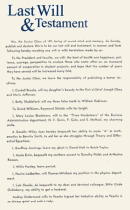 When a person dies, someone has to deal with their estate, which involves identifying all assets, paying any debts and distributing the balance to the people entitled to it (or grabbing cash off them to meet any deficit). When a person dies, someone has to deal with their estate, which involves identifying all assets, paying any debts and distributing the balance to the people entitled to it (or grabbing cash off them to meet any deficit).
The probate registry issues a 'grant of representation' to the executor(s) named in the will; or other suitable persons if no executor is named in the will or there is no will.
Naturally, the state and the legal profession see this as a money-making opportunity.
In England, tackling an uncomplicated probate job [for those do-it-yourselfers who don't want to pay a small fortune to a solicitor] is a simple matter of filling in a form, taking it to an appropriate centre where an officer makes sure that each and every box has been ticked or filled in, and handing over £130. The applicant is interviewed to make sure that the information supplied is accurate and the grant is usually sent by post.
Across the Irish Sea, the probate registry wants £500 from the customers when even a modest estate is involved. The reason for the higher cost is that in Northern Ireland, relatives of the deceased have to let an official fill in the form on their behalf.
Apparently, the Irish can't be trusted with such a complicated job. And even if the customers are English relatives of a former Ulster resident, they still have to stump up the £500 because they are deemed no longer capable of filling in a form once they set foot on Ulster soil.
Anyone who isn't a UK citizen (even someone born in the UK who has moved abroad) has to use a solicitor for this initial step. Which raises the interesting questions:
- "Is the solicitor allowed to fill in the probate form?" or
- "Is the solicitor deemed too thick to do it [because he/she lives in Ulster] and does the solicitor have to take the client's information to an official at the probate registry, who then fills in the form?"
Any complications, such as a will being lost (or destroyed by the deceased and not replaced) have to be referred to a mysterious being called The Master; which immediately conjurs up a mental image of Dr. Who's arch-enemy and leaves his potential victims in a state of fear and trembling at the prospect of confronting him.
And even if the relatives of the deceased are in full agreement about what to do with the assets in the absence of a will, The Master still has to pronounce on the case.
Of course, anyone who is obliged to go before The Master cannot do so without a solicitor in attendance. Which means the cost of dealing with an uncomplicated estate in Northern Ireland can go up and up relentlessly. Which begs the question: "Why do the people of Northern Ireland stand for having their pockets picked so freely by the legal profession?"
Do they actually enjoy being bossed about by bureaucrats? Or do they have some secret way of going about things cheaply which their English cousins don't know about?
 
|  Nice work for the lawyers in Ulster – or
Nice work for the lawyers in Ulster – or

 Nice work for the lawyers in Ulster – or
Nice work for the lawyers in Ulster – or
